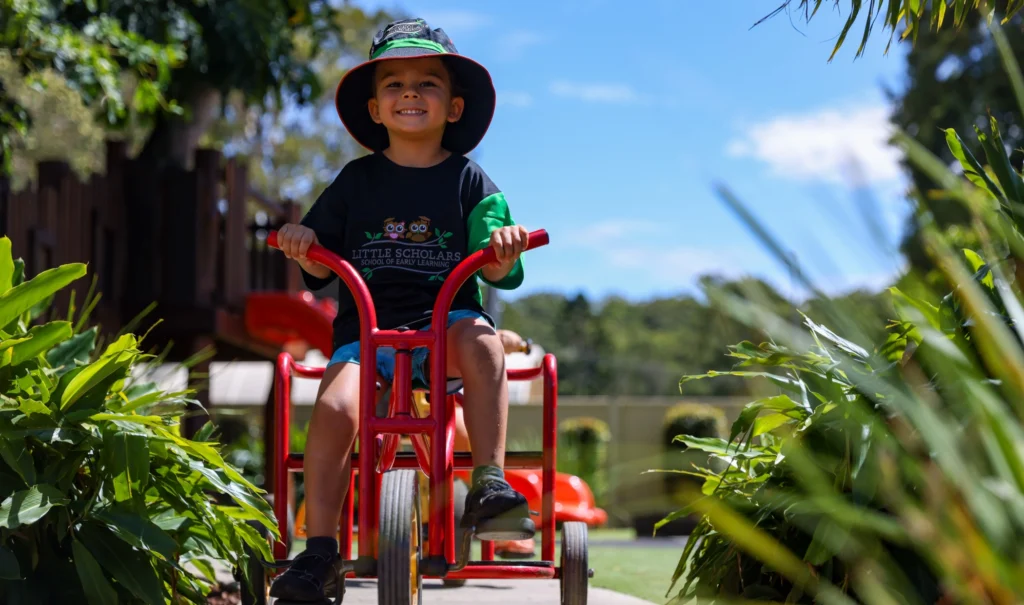At Little Scholars, the Early Childhood Australia Code of Ethics serves as one of the guideposts in our approach to education, informing our interactions with children, families, colleagues, and the wider community. Our dedicated educators embrace these ethical standards, continually striving to provide a caring, inclusive, and stimulating environment for every child in our care.
By taking on board the ECA Code of Ethics, you can rest assured that we are committed to providing a nurturing and enriching environment for your child. But what is the ECA Code of Ethics? Let’s take a closer look.
Book a personalised tour of one of our campuses today. We look forward to welcoming you and your child to our community.

Understanding the ECA Code of Ethics
The ECA Code of Ethics is a set of guiding principles designed to help early childhood professionals navigate the complex decision-making processes involved in their work. It is a living document developed by Early Childhood Australia, Australia’s leading advocacy organisation for children’s rights and education.
The importance of the ECA Code of Ethics in early childhood education cannot be overstated. It informs and guides educators on their ethical responsibilities, promoting integrity and professionalism. By committing to the Code, educators reaffirm their responsibility to children’s well-being, learning, and rights, thereby cultivating learning environments that are nurturing, inclusive, and respectful.
The ECA Code of Ethics also offers a common language for discussing ethical issues and dilemmas that may arise in early childhood settings. For example, it supports educators in making decisions that align with core ethical values, fostering trust and collaboration among colleagues, families, and communities.
At Little Scholars, we wholeheartedly embrace the ECA Code of Ethics, using it as a compass in our daily practices and interactions. Let’s take a closer look at the code’s core principles.
Core principles of the ECA Code of Ethics
The ECA Code of Ethics rests on a set of deeply held values. These values are central to early childhood education and direct decision-making processes concerning ethical responsibilities. They emphasise respect and uphold the rights and dignity of all – children, families, colleagues, and communities. The ECA Code of Ethics principles are based on the United Nations Convention on the Rights of the Child, an international agreement on childhood developed in 1991.
One of the core principles emphasises the uniqueness of each child. This principle recognises that every child, with their individual interests and strengths, has the potential to contribute significantly to their communities.
They also acknowledge that children, from birth, are full-fledged citizens, deserving of civil, cultural, linguistic, social, and economic rights. This principle emphasises that children are not merely passive recipients but active participants in society.
Effective learning and teaching is seen as a professional undertaking that utilises specialised knowledge and incorporates diverse perspectives. This principle values informed decision-making in shaping learning environments and experiences.
The Code of Ethics also underscores the importance of partnerships with families and communities. These partnerships foster shared responsibility and collective effort in promoting children’s learning, development, and well-being.
Promoting democratic, fair, and inclusive practices is another core principle of the ECA Code of Ethics. It recognises the importance of equity and cultivates a strong sense of belonging among all participants.
At the heart of children’s education and care are respectful, responsive, and reciprocal relationships. This principle promotes a relationship-centred approach in all interactions involving children.
The importance of play and leisure in children’s learning, development, and well-being is also a key principle. This reflects the understanding that children’s engagement in play is not only natural but also essential for their holistic development.
Lastly, the Code of Ethics recognises that research, inquiry, and practice-based evidence are integral in informing quality education and care. This principle encourages a culture of continuous learning and evidence-based practice.
Educators’ commitments in the ECA Code of Ethics
The ECA Code of Ethics outlines several significant commitments that educators make as they undertake their crucial role in the field of early childhood education. These commitments form the ethical backbone of the profession, providing guidance and norms to ensure the best possible care and education for all children.
Commitment to children
Foremost in the Code of Ethics, educators pledge to act in the best interests of all children. They commit to creating safe, inclusive, and stimulating learning environments that respect children’s agency, balance child-led and educator-initiated experiences, and value the role of play in learning and development.
Commitment to families
Educators also commit to maintaining strong, respectful, and cooperative relationships with families, recognising the vital role that family plays in a child’s life and learning. They promise to treat all families with respect, regardless of their composition, circumstances, or cultural background.
Commitment to colleagues
The Code encourages educators to cultivate supportive and respectful relationships with their professional peers. They commit to collaborate, share knowledge, and provide support to enhance the quality of care and education provided.
Commitment to the profession
A pledge to uphold the reputation and standards of the early childhood education profession is also central to the Code of Ethics. Educators commit to engaging in continuous professional learning, and upholding ethical standards and policies in their practice.
Commitment to community and society
Finally, the Code recognises educators’ role within larger communities and societies. They commit to promote the value of early childhood education, advocate for the rights and wellbeing of all children, and act as stewards of the environment for current and future generations.
For further information regarding the educators commitments outlined in the ECA Code of Ethics, visit the ECA website.



